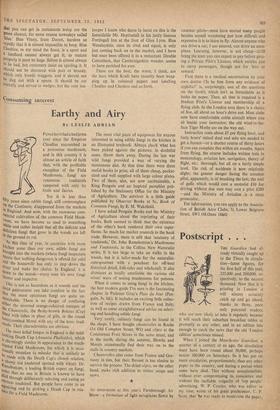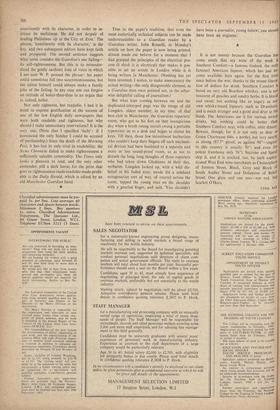Postscript . .
When I joined the Manchester Guardian, a quarter of a century or so ago, the circulation must have been round about 50,000, perhaps nearer 100,000 on Saturdays. So it has put on more circulation, proportionately, than any other paper in the country, and during a period when some have died. This without sensationalism, without ever compromising its conscience and without the ineffable vulgarity of 'top people' advertising. W. P. Crozier, who was editor in my time, wrote of his great predecessor, C. P. Scott, that 'he was ready to modernise the paper, consistently with its character, in order to in- crease its usefulness. He did not despair of leading Philistines up to the City of Zion.' The phrase, 'consistently with its character,' is the key, and two subsequent editors have kept faith and prospered. The second sentence suggests what some consider the Guardian's one failing— its self-righteousness. But this is to misunder- stand the gently sardonic tone of voice in which I am sure W. P. penned the phrase: his paper could sometimes fall into sanctimoniousness, but the editor himself could always make a family joke of the failing. In any case one can forgive an attitude of holier-than-thou in an organ that is, indeed, holier.
Not only righteous, but readable. I had it in mind to express gratification at the success of one of the few English daily newspapers that were both readable and righteous, but why should I make unnecessary reservations? It is the only one. (Note that I specified 'daily': if I nominated the only Sunday I could be accused of partisanship.) Since the death of the Morning Post, it has lost its only rival in readability; the News Chronicle failed to make righteousness a sufficiently saleable commodity. The Times only looks a pleasure to read, and the only other contender, still a dark horse, for the prize that goes to righteousness-made-readable-made-profit- able is the Daily Herald, which is edited by an old Manchester Guardian hand. True to the paper's tradition, that even the most esoterically technical subjects can be made understandable to a Guardian reader by a Guardian writer, John Rosselli, in Monday's 'article on how the paper is now being printed, almost made .me believe for a moment that I had grasped the principles of the electrical pro- cess (I think it is electrical) that makes it pos- sible to set an article in London while it is being written in Manchester. (Nothing has yet been invented, I notice, to make unnecessary the actual writing—the only disagreeable element, as a Guardian man once pointed out, in the other- wise delightful calling of journalism.) But what kept coming between me and the duplicated-teletyped page was the image of old Longden, oldest member, in my time, of that best club in Manchester, the Guardian reporters' room, who got to his feet on that inauspicious day when a brash young recruit swung a portable typewriter on to a desk and began to clatter his keys. Till then, those few incontinent barbarians who couldn't keep their fingers off such mechani- cal devices had been banished to a separate and more or less sound-proof molt, so as not to disturb the long, long thoughts of those reporters who had taken down Gladstone in their day, verbatim. Longden looked up, with a wild dis- belief in his faded eyes; strode (in a subdued octogenarian sort of way, of course) across the room, tapped the young man on the shoulder with a gnarled finger, and said, 'You shouldn't have been a journalist, young fellow; you should have been an engineer.'
It is not merely because the Guardian has come south that my wine of the week IS Southern Comfort—a famous (indeed, the ordY famous) American liqueur, which has just be- come available here again, for the first time since before the war, thanks to the recent libera- tion of dollars for drink. Southern Comfort if based on very old Bourbon whiskey, and is not innocent of peaches and sundry herbs. It is bland and sweet, but nothing like so sugary as our own whisky-based liqueurs, such as Drambuie, and is much stronger and a good deal drier at the finish. The Americans use it for various mixed drinks, but nothing could be better thaa Southern Comfort neat, with coffee, after dinner. Beware, though, for it is not only as dear as Green Chartreuse (66s. a bottle), but very nearlY as strong (87.7° proof, as against 960—cbgnae in this country is usually 700; and even the potent framboise only 76°). Saccone and Speed ship it, and it is stocked, too, by such sophls' ticated West End wine-merchants as Christophers of Jermyn Street, Block, Grey and Block of South Audley Street and Dolamore of Baker Street. One glass and one sees—not red, but Scarlett O'Hara.
CYRIL RAY



































 Previous page
Previous page